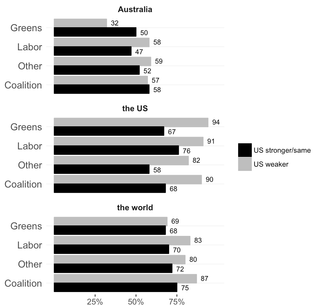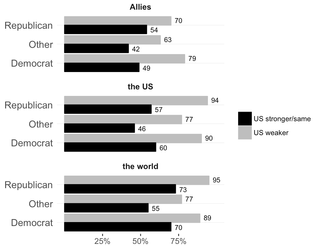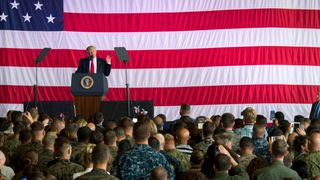Researchers from the United States Studies Centre (USSC) at the University of Sydney have released the results of an extensive comparison of public opinion on Donald Trump and perceptions of security and the strength of the United States.
Centre CEO Professor Simon Jackman and USSC political science lecturer Dr Shaun Ratcliff commissioned public opinion surveys in the United States and Australia with YouGov PLC, as part of an ongoing partnership between USSC and YouGov announced earlier in 2017.
“The USSC-YouGov poll shows there is a general view among Australians and Americans that the world has become a more dangerous place in recent years, and that things are more dangerous for the United States. In part this is driven by concern about America’s declining strength,” Professor Jackman said.
Key findings
- Australians tend to see danger and threats as things that happen elsewhere. Seventy-seven per cent of Australians believe that things have become more dangerous for the entire world over the past few years; 78 per cent see things as more dangerous for the United States, while just 54 per cent believe things have become more dangerous for Australia.
- Seventy-one per cent of Americans believe things are more dangerous for the entire world, 64 per cent more dangerous for the United States, and 56 per cent believe things have become more dangerous for US allies.
- Australians are more likely to be pessimistic on the strength of the United States, with 46 per cent saying the United States has become weaker and only 19 per cent saying the United States has become stronger in the last year.
- Americans are slightly more positive. Thirty-six per cent say their country has become weaker, and 30 per cent stronger. There was large variation in how Democrats and Republicans respond. More than 70 per cent of Democrats said the United States had become weaker, while less than 7 per cent of Republicans agreed.
- Beliefs of American strength are strongly associated with perceptions of danger in the world. Australians who state that the United States has become weaker are more likely to perceive things have become more dangerous for the world, and for the United States itself. This suggest that many Australians (and Americans) associate international stability and security with American strength.
- Americans who say the United States has become weaker are 20 percentage points more likely to say things were more dangerous for the world, 33 points more likely to say the United States faces greater dangers and 24 points more likely to say things are more dangerous for US allies, relative to those who did not believe the United States had become weaker.
The technical part
The United States Studies Centre and YouGov surveyed 1032 respondents in Australia and 1127 in the United States in mid-December 2017. These respondents were recruited from YouGov’s online panel.
Responses were weighted by YouGov to ensure a sample representative of the Australian and American populations. The Australian sample was weighted by age, gender, education, region (crossed with city, non-city) and past vote. The US sample was weighted by age, gender, race, education, region, voter registration, and vote choice in the 2012 and 2016 presidential elections.
The margin of error is approximately 3 per cent for results reported for the full sample of both the Australian and American surveys. It is larger for sub-groups of the full samples.
Is the world a safer place?
In the December USSC-YouGov poll, Americans and Australians were asked whether things were safer, more dangerous or unchanged.
The question we asked was: Compared to several years ago, are things safer, more dangerous or unchanged, for …
- The entire world
- The United States
- Australia (asked of Australians only)
- America’s allies (asked in the United States only)
Response options were randomised to minimise any effect of their order on the results.
Australian results are shown in tables 1-3. We find that overall 77 per cent of Australians believe things are now more dangerous for the entire world; 78 per cent believe things have become more dangerous for the United States; and 54 per cent believed things had become more dangerous for Australia.
The next three tables show the responses obtained from Americans, which were similar to Australian responses. Seventy-one per cent believed that things are more dangerous for the entire world, 64 per cent believe more dangerous for the United States, and 56 per cent believed things had become more dangerous for America’s allies.
In Australia there were few significant partisan differences on the question of whether the world had become more dangerous, or that things had become more dangerous for Australia; with supporters of other parties and candidates being the outlier, saying things had become less dangerous for the world and Australia. Labor voters and the supporters of other parties and candidates were also more likely to say thing had become more dangerous for the United States, while the Greens were the least likely to agree.
Partisan differences were much larger in the United States. Democratic voters were consistently more likely than Republicans and other voters to say things were more dangerous. They were 9 per cent more likely than Republicans to say things were more dangerous for the world, 22 per cent more likely to say they were more dangerous for US allies, and 15 per cent more likely to say they were more dangerous for the United States.
Australian responses
Compared to several years ago, are things safer, more dangerous or unchanged, for…
...the world?
| Response | Coalition (%) | Other (%) | Labor (%) | Greens (%) | Total (%) |
|---|---|---|---|---|---|
| Safer | 8 | 6 | 7 | 11 | 8 |
| Unchanged | 11 | 14 | 12 | 15 | 12 |
| More dangerous | 79 | 75 | 77 | 69 | 77 |
| Don't know | 2 | 5 | 4 | 5 | 3 |
...the United States?
| Response | Coalition (%) | Other (%) | Labor (%) | Greens (%) | Total (%) |
|---|---|---|---|---|---|
| Safer | 10 | 8 | 7 | 7 | 8 |
| Unchanged | 11 | 17 | 6 | 6 | 10 |
| More dangerous | 76 | 68 | 84 | 87 | 78 |
| Don't know | 4 | 7 | 3 | 1 | 4 |
...Australia?
| Response | Coalition (%) | Other (%) | Labor (%) | Greens (%) | Total (%) |
|---|---|---|---|---|---|
| Safer | 15 | 14 | 14 | 20 | 15 |
| Unchanged | 25 | 24 | 27 | 37 | 27 |
| More dangerous | 58 | 55 | 53 | 37 | 54 |
| Don't know | 2 | 8 | 5 | 6 | 4 |
Australians saying things are more dangerous for...
American responses
Compared to several years ago, are things safer, more dangerous or unchanged, for…
...the world?
| Response | Democrats (%) | Other (%) | Republicans (%) | Total (%) |
|---|---|---|---|---|
| Safer | 4 | 8 | 8 | 7 |
| Unchanged | 8 | 15 | 13 | 13 |
| More dangerous | 84 | 62 | 75 | 71 |
| Don't know | 5 | 14 | 4 | 9 |
...the United States?
| Response | Democrats (%) | Other (%) | Republicans (%) | Total (%) |
|---|---|---|---|---|
| Safer | 6 | 11 | 24 | 13 |
| Unchanged | 9 | 19 | 14 | 15 |
| More dangerous | 82 | 55 | 60 | 64 |
| Don't know | 3 | 15 | 3 | 8 |
...America's allies?
| Response | Democrats (%) | Other (%) | Republicans (%) | Total (%) |
|---|---|---|---|---|
| Safer | 6 | 7 | 18 | 10 |
| Unchanged | 13 | 15 | 19 | 15 |
| More dangerous | 70 | 49 | 55 | 56 |
| Don't know | 11 | 29 | 8 | 18 |
Americans saying things are more dangerous for...
Do you think the United States has become stronger or weaker?
We also asked respondents: Do you think the United States has become stronger, weaker, or neither stronger nor weaker?
When asking this question, to test the effect of Donald Trump’s election on responses, a third of the sample in both surveys was randomly asked whether the United States had become ‘stronger, weaker, or neither stronger nor weaker’ in the year since Donald Trump became president. Another third was asked what the change had been since the end of the Obama administration. A final control group was asked about the change in US strength in the last year.
Australians were more likely to be pessimistic on the strength of the United States, with 46 per cent saying it had become weaker and only 19 per cent saying it had become stronger. Americans were slightly more positive. Thirty-six per cent believed their country had become weaker, and 30 per cent stronger.
Australian respondents were more likely to say the United States had become weaker since the end of the Obama administration, with 49 per cent of those receiving this version of the question providing this response. The difference between question versions was small, though, with 45 per cent of Australian respondents saying the United States had become weaker in the year since Donald Trump became president.
Australian respondents exhibited noticable partisan behaviour on this question. Coalition respondents, and those who supported other parties and candidates, were less likely to say the United States had become weaker when promoted with the Trump version of the question, and more likely to do so when given the Obama version. Labor voters were more likely to say America had become weaker when given the Trump treatment, and less likely to do so when they received the control question. Conversely, Greens voters given the control question were more likely to believe the United States had become weaker, although the sample size here in small.
In contrast, American voters responded about the same to all three versions of the question. Those provided with the Trump variant were just 3 per cent more likely than those given the Obama question to say the United States had become weaker (38 per cent to 35 per cent), with little difference between Democrats and Republicans.
However, under all of this, there were large variation in how Democrats and Republicans responded to the question regardless of how it was asked, with Democrats ten times more likely than Republicans to say the United States had become weaker. For all three question versions, more than 70 per cent of Democrats said the United States had become weaker, while less than 7 per cent of Republicans agreed. Approximately a third of other voters also believed the United States was now weaker than it had been before.
Per cent of Australian respondents saying the United States is weaker...
| Treatment | Coalition (%) | Other (%) | Labor (%) | Greens (%) | Total (%) |
|---|---|---|---|---|---|
| ...in the last year | 35 | 38 | 48 | 78 | 43 |
| ...since the end of the Obama administration | 39 | 49 | 57 | 73 | 49 |
| ...in the year since Trump became president | 29 | 37 | 60 | 69 | 45 |
| Total | 35 | 41 | 55 | 73 | 46 |
Per cent of US respondents saying the United States is weaker...
| Treatment | Democrats (%) | Other (%) | Republicans (%) | Total (%) |
|---|---|---|---|---|
| ...in the last year | 70 | 33 | 6 | 35 |
| ...since the end of the Obama administration | 71 | 30 | 8 | 35 |
| ...in the year since Trump became president | 74 | 33 | 6 | 38 |
| Total | 72 | 32 | 7 | 36 |
Does a weaker United States make the world more dangerous?
Concerns about a weaker United States appear to drive fears about the danger facing the United States itself, as well as the world.
Australian respondents who believed the United States was now weaker than it was in the past were 8 per cent more likely to say things were more dangerous for the world, and 22 per cent more likely to believe there was more danger for the United States. There was no significant association between Australian perceptions of US power and the danger facing Australia.
Americans who saw US strength declining were 20 per cent more likely to say things were more dangerous for the world, 33 per cent more likely to believe there was more danger for the United States and 24 per cent more likely to say things are more dangerous for US allies.
No significant partisan effects were observed for Australians' perceptions of danger in the world and for the United States, but Labor voters who saw the United States as being weaker were more likely to see greater danger for Australia. Coalition voters appear to be unaffected by perceptions of US strength, while Greens who see the United States as being weaker appear to see Australia being safer. In the United States there were no clear partisan effects for any of the questions.
Per cent of Australian respondents saying things are more dangerous for...
| ...the world | ...the United States | ...Australia | ||||||||||
|---|---|---|---|---|---|---|---|---|---|---|---|---|
| Party | US stronger/same | US weaker | Total | US stronger/same | US weaker | Total | US stronger/same | US weaker | Total | |||
| Coalition | 75 | 87 | 79 | 68 | 90 | 76 | 58 | 57 | 58 | |||
| Other | 72 | 80 | 75 | 58 | 82 | 68 | 52 | 59 | 55 | |||
| Labor | 70 | 83 | 77 | 76 | 91 | 84 | 47 | 58 | 53 | |||
| Greens | 68 | 69 | 69 | 67 | 94 | 87 | 50 | 32 | 37 | |||
| Total | 73 | 81 | 77 | 68 | 90 | 78 | 53 | 54 | 54 | |||
Per cent of Australian respondents saying things are more dangerous for...

Per cent of American respondents saying thing are more dangerous for...
| ...the world | ...the United States | ...Australia | ||||||||||
|---|---|---|---|---|---|---|---|---|---|---|---|---|
| Party | US stronger/same | US weaker | Total | US stronger/same | US weaker | Total | US stronger/same | US weaker | Total | |||
| Democrat | 70 | 89 | 84 | 60 | 90 | 82 | 49 | 79 | 70 | |||
| Other | 55 | 77 | 62 | 46 | 77 | 55 | 42 | 63 | 49 | |||
| Republican | 73 | 95 | 75 | 57 | 94 | 60 | 54 | 70 | 55 | |||
| Total | 64 | 84 | 71 | 52 | 85 | 64 | 48 | 72 | 56 | |||
Per cent of American respondents saying things are more dangerous for...

Background to the USSC-YouGov poll
In September 2017, the United States Studies Centre announced that it had partnered with global survey company YouGov, which now provides the Centre with exclusive, monthly polling data from the United States and Australia; tracking not just perceptions of political leadership in both countries, but also unique, targeted insights on a diverse range of topics.
CEO of the United States Studies Centre Professor Simon Jackman, a leader in public opinion research, has previously worked as one of the principal investigators of the American National Election Studies and partnered with media outlets including the Guardian Australia and the Huffington Post on pre-election polling. He said the results provided by YouGov as part of the new partnership will allow the Centre to analyse and publish unprecedented comparative data.
“The United States Studies Centre has taken a keen interest in the attitudes and opinions of people in our region, with research like our surveys into America’s role in the Indo-Pacific. This exciting new partnership with YouGov gives us the opportunity to broaden that focus to public opinion in the United States and then contrast that with the views of people in our own backyard,” Jackman said. “The Centre has a mandate to deepen Australia’s understanding of America. This ongoing commitment to charting public perceptions in both countries is an ideal way for Australians to gain perspective on the United States.”
YouGov is a market research and opinion polling company headquartered in the the United Kingdom, with operations in Europe, North America, the Middle East and the Asia-Pacific.







